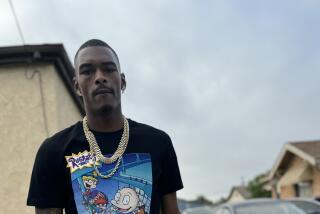Book review: ‘Decoded’ by Jay-Z
Jay-Z is a great American artist — and he’d be the first to tell you so. “Decoded” is an elegantly designed, incisively written bid for cultural legitimacy by a man whose XXL ego is underscored by an equally outsized inferiority complex (as big egos so often are).
To Jay-Z’s credit, this hip-hop art book is not just one man’s memoir. It’s also a passionate defense of a musical form that’s often as misunderstood as this complicated spokesman. Just as it’s hit the economic skids, hip-hop has a champion on a rescue mission. By making his story not merely part of, but subservient to, a much larger cultural narrative, the rapper who was born Shawn Carter 41 years ago on Dec. 4 performs the sort of heroic act that could grant him redemption for the sins that haunt “Decoded.” If he could just get out of his own way.
“Decoded” is not Mr. Beyoncé Knowles’ long-awaited autobiography, “The Black Book.” Jay-Z decided against telling all and canceled that contract. After reading “Decoded,” I can’t help but wonder if Jay-Z blinked because there are too many skeletons in the onetime crack dealer’s closet. Instead, “Decoded” is part art book, part lyrical compilation (and explication) and part personal narrative. For Jay-Z, the personal is historical. He wanted “Decoded” to do three things, he writes: “make the case that hip-hop lyrics — not just my lyrics, but those of every great MC — are poetry if you look at them closely enough. The second was I wanted the book to tell a little bit of the story of my generation, to show the context for the choices we made at a violent and chaotic crossroads in recent history. And the third piece was that I wanted the book to show how hip-hop created a way to take a very specific and powerful experience and turn it into a story that everyone in the world could feel and relate to.”
A Rorschach painting by Andy Warhol, rather than a photo of the celebrity author, gives the book a golden, conceptual cover. Inside, lavish photos and illustrations again depict not Jay-Z but his heroes and friends: Biggie Smalls, Quincy Jones, Michael Jordan, Lauryn Hill. “Decoded” credits the author with art design, but in the acknowledgments, Jay-Z thanks Rodrigo Corral Design. Similarly, Jay-Z is the sole listed writer, but he thanks journalist dream hampton (his erstwhile coauthor on “The Black Book”), who has said she was a collaborator.
Hampton’s historically astute literary style certainly sets much of the tome’s tone, particularly in the footnotes to the lyrics. It might have looked better if the man nicknamed (Jay) Hova had credited these often lengthy exegeses, wherein he explains his own genius, to another voice. Lots of songwriters prefer to let their lyrics stand for themselves. Not Hova. Perhaps defending himself against the haters who for years have criticized him as a plagiarist, he describes the factual and creative mechanisms of 36 songs. Just when you’re about to skip another tediously obvious footnote, Jay-Z offers some important biographical detail — like his troubled relationship to his deceased, deadbeat father — in the fine print.
Jay-Z’s is a classic American story: the project child who grows up to be the self-made multimillionaire superstar. But it’s darker — more real — than the usual Horatio Alger myth. The author doesn’t apologize for his drug-dealer past. Indeed, one of his central arguments is that hip-hop is the story of the hustler. That may be true for him and others, but as he acknowledges, that doesn’t account for Hill, or A Tribe Called Quest or Public Enemy.
When he’s not asserting he is hip-hop, Jay-Z admits he made mistakes — that, although he never uses this word (which has a complex history in hip-hop), he acted like a thug. Guilt as much as ego drives “Decoded.” In the prose sections that are the book’s best bits, he reveals moments of hardship and humility that propelled his ongoing transformation. This isn’t just about the hustling; Hurricane Katrina and the election of Barack Obama play key roles.
His love of music saved Jay-Z, and it’s “Decoded’s” defining grace. He turns a description of sampling into a poetic statement about paternity and generations: “Rap took the remnants of a dying society and created something new. Our fathers were gone, usually because they just bounced, but we took their old records and used them to build something fresh.”
Jay-Z’s story may not be the story of hip-hop, but it’s a story — and an important one. That’s not just because he’s one of the music’s greatest figures; it’s because for all his specialness, as he himself says, what happened to Jay-Z is typical of what happened to a generation: the black male youths who Ice Cube called an endangered species. One of those species didn’t die; he survived and thrived. For those who didn’t understand it when he rapped about it — including such public figures as Oprah Winfrey, as Jay-Z writes in the epilogue — “Decoded” is an illustrated history lesson. It may not convince the haters, but it’s an impressive leap by a man who has never been known for small steps.
McDonnell is an assistant professor of journalism and news media at Loyola Marymount University. She is also the author of “Mamarama: A Memoir of Sex, Kids, and Rock ‘N’ Roll.”
More to Read
The biggest entertainment stories
Get our big stories about Hollywood, film, television, music, arts, culture and more right in your inbox as soon as they publish.
You may occasionally receive promotional content from the Los Angeles Times.










